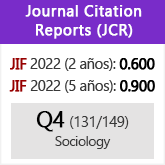Contribución del feminismo de la diferencia sexual a los análisis de género en el deporte
DOI:
https://doi.org/10.3989/ris.2006.i44.30Palabras clave:
Diferencia sexual femenina, Género, Relaciones entre mujeres, RugbyResumen
En este artículo la autora examina las aportaciones del feminismo italiano de la diferencia sexual a los análisis de las experiencias de las mujeres en el rugby. La autora utiliza los conceptos más característicos de esta teoría, como por ejemplo, relaciones de affidamento, autoridad femenina y deseo y libertad femenina, para mostrar la necesidad de crear un lenguaje que permita pensar e interpretar experiencias de la práctica del rugby desde el ser femenino. En definitiva, en este artículo se explora la posibilidad de analizar los significados sociales del rugby femenino más allá de los estereotipos tradicionales de género. El artículo acaba apuntando la importancia de crear un orden simbólico alternativo al existente, que legitime a la mujer como sujeto de sus experiencias y no tan solo como objeto de estudio de éstas.
Descargas
Citas
Birrell, S. (2000), “Feminist theories for sport”, en J. Coakley, E. Dunning (eds.), Handbook of sport studies, Londres, Sage, pp. 61-76.
Blasco, P. (2005), Siempre adelante. Mujeres deportistas, Madrid, Instituto de la Mujer.
Bocchetti, A. (1996), Lo que quiere una mujer, Madrid, Cátedra.
Braidotti, R. (1997), “Sexual difference theory”, en A.M. Jaggar y I.M. Young (eds.), A companion to feminist philosophy, Oxford, Blackwell, pp. 298-306.
Broad, K. L. (2001), “The gendered unapologetic: Queer resistance in women’s sport”, Sociology of Sport Journal, vol. 18, pp. 181-205.
Carle, A. y J. Nauright (1999), “Crossing the line: Women playing rugby union”, en S. Chandler y J. NAURIGHT (eds.), Making the rugby world, Londres, Frank Cass, pp.128-148.
Caudwell, J. (2003), “Sporting gender: Women’s Footballing Bodies as Sites/Sights for the (Re)Articulation of Sex, Gender and Desire”, Sociology of Sport Journal, nº 22, pp. 371 – 386.
Caudwell, J. (1999), “Women’s football in the United Kingdom: Theorizing gender and unpacking the butch lesbian image”, Journal of Sport and Social Issues, vol. 4, pp. 390-402. doi:10.1177/0193723599234003
Cavarero, A. (1993), “Towards a theory of sexual difference”, en S. Kemp y P. Bono (eds.), The lonely mirror, Londres, Routledge, pp.189-221.
Cigarini, L. (1996), La política del deseo, Barcelona, Icaria.
Cox, B. y S. Thompson (2000), “Multiple bodies”, International Review for the Sociology of Sport, vol. 35, pp. 5-20. doi:10.1177/101269000035001001
Hall, A. (1996), Feminism and Sporting Bodies, “Essays on theory and practice”, Champaign, IL, Human Kinetics, Publishers.
Hargreaves, J. (1994), Sporting Female, Londres, Routledge.
Irigaray, L. (1985a), Speculum of the other woman, Ithaca, Cornell University Press. [1974]
Irigaray, L. (1985b), This sex which is not one, Ithaca, Cornell University Press.[1977]
Irigaray, L. (1993), Sexes and Genealogies, Nueva York, Columbia University Press.
Kemp, S. y P. Bono (1993), “Introduction. Without a leg to stand on”, S. Kemp y P. Bono (Eds.), The lonely mirror, Londres, Routledge, pp. 1-28.
Krane, V. (2001), “We can be athletic and feminine, but do we want to? Challenging hegemonic femininity in women’s sport”, Quest, vol. 53, pp. 115-133.
Librería de Mujeres de Milán (1991), No creas tener derechos, Madrid, Horas y horas.
Lledó, E. (2005), De llengua, diferència i context, Barcelona, Institut Català de la Dona.
Markula, P. (2003), “The technologies of the self: Sport, feminism and Foucault”, Sociology of Sport Journal, vol. 20, pp. 87-107.
Menesson, C. y J.P. Clement (2003), “Homosociability and homosexuality: the case of soccer played by women”, International Review for the Sociology of Sport, vol. 38, pp. 311-330. doi:10.1177/10126902030383004
Muraro, L. (1991), “Bonding and freedom”, en Bono P.; Kemp S. (eds.), Italian feminist thought (pp. 123-126), Oxford, Blackwell.
Muraro, L. (1994), El orden Simbólico de la madre, Madrid, Horas y horas.
Muraro, L. (2002), “The passion of feminine difference beyond equality”, en Parati, G. y R. West (eds.), Italian Feminist Theory and Practice. Equality and Sexual Difference, Londres, Associated University Presses, pp. 77-87.
Muraro, L. (2004), “Enseñar la libertad”, Duoda, nº 26, pp. 77-83.
Piussi, A. M. (1999), “La diferencia sexual, más allá de la igualdad”, Cuadernos de Pedagogía, nº 267, pp. 10-16.
Rivera, M. (1994), Nombrar el mundo en femenino, Barcelona, Icaria.
Rivera, M. (1997), El fraude de la igualdad, Barcelona, Planeta.
Scraton, S., G. Pfister, K. Fasting y A. Buñuel(1999), “It’s still a man’s game? The experiences of toplevel European women footballers”, International Review for the Sociology of Sport, vol. 34, pp. 99-111. doi:10.1177/101269099034002001
Seidman, S. (1994), Contested knowledge: Social theory in postmodern era, Cambridge, Basil Blackwell.
Theberge, N. (2000), “Gender and Sport”, en J. Coakley y E. Dunning (eds.), Handbook of sport studies, Londres, Sage.
Wesely, J.K. (2001), “Negotiating gender: Bodybuilding and the natural/unnatural continuum”, Sociology of Sport Journal, vol. 18, pp. 162-180.
Wedgwood, N. (2004), “Kicking like a boy: Schoolgirl Australian rules football and bi-gendered female embodiment”, Sociology of Sport Journal, vol. 21, pp. 140-162.
Weedon, C. (1987), Feminist practice and poststructuralist theory, Oxford, Basil Blackwell.
Wright, J. y G. Clarke (1999), “Sport, the media and the construction of compulsory Heterosexuality”, International Review for the Sociology of Sport, vol. 34, pp. 227-243. doi:10.1177/101269099034003001
Descargas
Publicado
Cómo citar
Número
Sección
Licencia
Derechos de autor 2006 Consejo Superior de Investigaciones Científicas (CSIC)

Esta obra está bajo una licencia internacional Creative Commons Atribución 4.0.
© CSIC. Los originales publicados en las ediciones impresa y electrónica de esta Revista son propiedad del Consejo Superior de Investigaciones Científicas, siendo necesario citar la procedencia en cualquier reproducción parcial o total.Salvo indicación contraria, todos los contenidos de la edición electrónica se distribuyen bajo una licencia de uso y distribución “Creative Commons Reconocimiento 4.0 Internacional ” (CC BY 4.0). Puede consultar desde aquí la versión informativa y el texto legal de la licencia. Esta circunstancia ha de hacerse constar expresamente de esta forma cuando sea necesario.
No se autoriza el depósito en repositorios, páginas web personales o similares de cualquier otra versión distinta a la publicada por el editor.

















